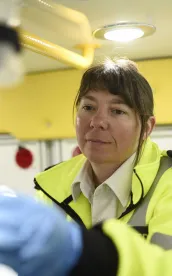One of the challenges Canadian employers face when hiring international candidates is that standards for training, education, and certifications can be different from place to place.

Before you move, you can get your credentials assessed. This can help you:
- Show employers what you are qualified for
- Understand what types of jobs you might be qualified for
- Tell if your credentials are equal to the standards set for Canadian workers
- Find out if you need more training, education, or Canadian work experience
Here are some important things to know about training and certification equivalencies in Canada:
Regulated Professions
Some professions, like those in the health care industry or skilled trades for example, are regulated. This means certain qualifications or training certifications are required for employment. You may already have the training needed, but if it was gained outside of Nova Scotia it may not be fully recognized. Employers and regulatory bodies will need to determine the Nova Scotia equivalent to help them decide what positions you qualify for. This will also help decide if there are any additional training or upgrades you may need.
A list of Nova Scotia’s regulatory bodies can be found on the Recognition of Prior Learning and Labour Mobility website.
Unregulated Professions
Even unregulated professions have generally-accepted credentials. Despite extensive training, you may need further education/training to upgrade or verify that your abilities meet Nova Scotia standards. To avoid frustration later, know your international qualifications before coming to Nova Scotia.
Additional Training/Educational Documentation
Collect any additional training/educational documentation you have before moving. Course descriptions, exams, syllabuses, transcripts, etc., can help employers understand the nature of training and/or programs they are not familiar with.
NOTE: For more information visit the Foreign Credentials Referral Office and Working in Canada website, or find help directly on credential evaluation services. For additional help on credential recognition visit Immigrant Services Association of Nova Scotia.

Nova Scotia Apprenticeship Agency (NSAA) promotes apprenticeship as a post-secondary option for young and mature individuals who want to be certified to work in a skilled trade. Upon completion of the apprenticeship program, apprentices are eligible to write a provincial or Red Seal certification exam. Get started with an apprenticeship.
Funding and supports for those seeking to become Apprentices and/or gain certifications in their trades.
Funding and supports for employers who wish to hire apprentices.

Like many professions, most health care jobs are regulated positions. See below for more information.

Post-Secondary and Upskilling
If you’re looking to upskill or complete additional training, Nova Scotia is home to 10 universities, 13 community college campuses and hundreds of programs of study.





